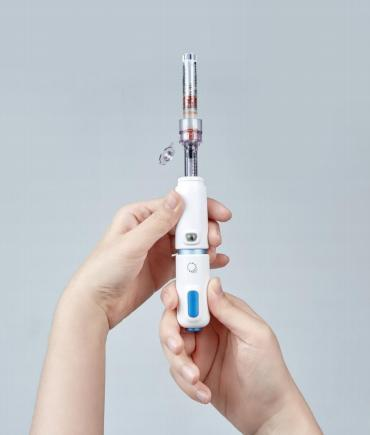In recent years, the development of DNA vaccines has shown significant promise in the field of immunization. These vaccines work by
introducing a small, circular piece of DNA (plasmid) encoding the antigenic protein of a pathogen, prompting the body’s immune system to recognize and combat the real pathogen if encountered. However, the delivery method of theseDNA vaccines plays a crucial role in their efficacy. Traditional needle-based injections, while effective, come with various drawbacks such aspain, needle-stick injuries, and needle phobia. This has led to an increased interest in alternative delivery methods, one of which is the needle-free injector.
What is Needle-Free Injectors?
Needle-free injectors are devices designed to deliver medications or vaccines without the use of a traditional needle. They work by using a high-pressure jet to penetrate the skin and deliver the substance directly into the tissue. This technology has been around for decades but has recently gained more attention due to advancements in its design and effectiveness.
Advantages of Needle-Free Injectors
Painless Delivery: One of the most significant advantages of needle-free injectors is the reduction in pain and discomfort. The absence of a needle

eliminates the sharp pain associated with traditional injections, making the experience more pleasant for patients.
Elimination of Needle-Related Risks: Needle-free injectors eliminate the risk of needle-stick injuries, which area significant concern in healthcare settings. This not only protects healthcare workers but also reduces the risk of cross-contamination and infection.
Enhanced Vaccine Uptake: Needle phobia is a common reason for vaccine hesitancy. By removing the needle, these devices can potentially increase vaccine acceptance and uptake, which is crucial for public health initiatives.
Improved Immunogenicity: Some studies have suggested that needle-free injectors can enhance the immunogenicity of vaccines. The high- pressure jet may help in better dispersion of the vaccine within the tissue, leading to a more robust immune response.
Effectiveness of Needle-Free Injectors for DNA Vaccines
The effectiveness of needle-free injectors in delivering DNA vaccines is an area of active research. Several studies have shown promising results:
Enhanced DNA Uptake: The high-pressure delivery mechanism of needle-free injectors facilitates better uptake of DNA plasmids by cells. This is crucial for DNA vaccines as the plasmid needs to enter the cells to produce the antigenic protein.
Strong Immune Response: Research has indicated that DNA vaccines delivered via needle-free injectors can induce a stronger and more
sustained immune response compared to traditional needle-based methods. This is attributed to the efficient delivery and better distribution of the vaccine within the tissue.
Safety and Tolerability: Needle-free injectors have been found to be safe and well-tolerated by patients. The absence of needles reduces the risk of adverse reactions at the injection site, such aspain, swelling, and redness.
Challenges and Considerations
While needle-free injectors offer numerous advantages, there are still challenges and considerations to address:
Cost: Needle-free injector devices can be more expensive than traditional syringes, which may limit their widespread adoption, especially in low-resource settings.
Training: Proper training is required for healthcare providers to use needle-free injectors effectively. Incorrect usage can lead to improper vaccine delivery and reduced efficacy.
Device Maintenance: These devices require regular maintenance and calibration to ensure consistent performance. This can be a logistical challenge in some healthcare environments.
Conclusion
Needle-free injectors represent a promising advancement in the delivery of DNA vaccines. Their ability to provide painless, safe, and potentially more effective immunization makes theman attractive alternative to traditional needle-based methods. While there are challenges to overcome, the continued development and refinement of this technology could play a significant role in improving vaccine delivery and public health outcomes. As research progresses, needle-free injectors may become a standard tool in the fight against infectious diseases, providing a more comfortable and efficient vaccination experience for all.
Post time: Jul-01-2024
